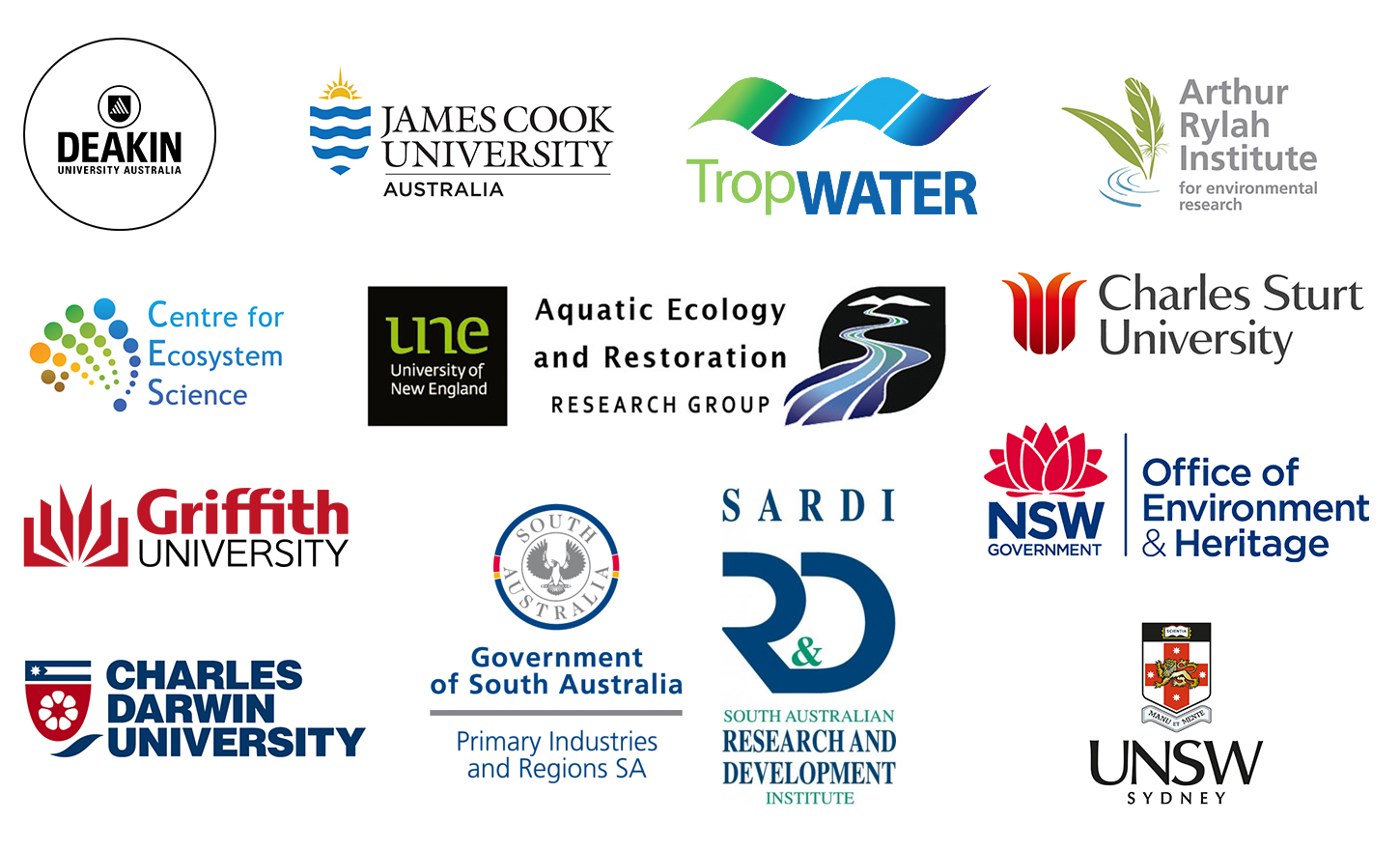Collaboration occurs at an organisational level through the Jurisdictional Reference Group, comprising direct input from Federal Government agencies – Murray-Darling Basin Authority and the Commonwealth Environmental Water Office – as well as representatives from each of the Murray-Darling Basin State agencies.
We also collaborate at a scientific level, with all MDB EWKR research overseen by a Scientific Advisory Group. Our research teams are drawn from Australia’s top research organisations, and we focus our efforts in four themes directly relevant to delivering the Basin Plan. You can explore these four themes by following the links below:
In addition to the four themes is our adoption and communication effort, that synthesises across disciplinary boundaries and shares our knowledge widely.
On-ground project sites:
The partnerships that underpin MDB EWKR are focusing their work in four Murray-Darling Basin sites, where questions have been asked about what information managers need to make practical environmental watering decisions. By talking to water managers through workshops, surveys and lots of individual conversations, MDB EWKR researchers have targeted their research to answering real-life environmental watering questions. Our four sites are shown in the diagram below.

Site descriptions:
1. The Lower Balonne floodplain, including Narran Lakes (Northern Basin). The system is a management priority because the Narran Lakes is Ramsar listed and the area supports important species that are listed in international agreements.
2. The Macquarie Marshes (Central Basin). The Marshes are recognised as an important bird breeding site and is Ramsar listed. The Marshes also regularly receive New South Wales and Commonwealth environmental flows.
3. The Upper Murray – centred around Barmah-Millewa Forest and potentially including lower reaches of adjacent tributaries (Goulburn and Campaspe) and parts of the Edward-Wakool system (Southern Basin – Upper Murray). The Barmah national park is internationally recognised wetland, listed under the Ramsar convention. The Barmah-Millewa forest is a Living Murray icon site and the area is one of the most intensively studied areas in the Basin.
4. The Lower Murray – centred around the Chowilla-Lindsay-Wallpolla Floodplain including the Riverland Ramsar Site, and potentially including adjacent floodplain systems and river reaches (Southern Basin – Lower Murray). The Chowilla area is also Ramsar listed and a Living Murray icon site that regularly receives environmental flows through the CEWO and TLM. There is also an extensive body of knowledge derived from research and monitoring.
Working across these four sites are research teams drawn from different institutions, each with expertise in aspects of Murray-Darling Basin ecological functioning and environmental management.
MDB EWKR Research team members:
To access the contact details of MDB EWKR Theme Teams just click on the Theme title and you will go to the relevant page with emails and bios of our great people.
Institution |
Vegetation
|
Queensland Vegetation |
Fish Theme |
Waterbird
|
Food Web Theme |
| MDFRC/ La Trobe | Cherie Campbell (coordinator) | Amina Price (coordinator) | Paul McInerney (coordinator) | ||
| Nick Bond | |||||
| CSIRO | Daryl Nielsen | Heather McGinness (coordinator) | Barbara Robson | ||
| Veronica Doerr | |||||
| University of Canberra | Ralph MacNally | Ross Thompson | |||
| Arthur Rylah Institute | Kay Morris | ||||
| Charles Darwin University | Alison King | ||||
| Charles Sturt University | Paul Humphries | ||||
| Deakin University | Rebecca Lester | ||||
| Griffith University | Sam Capon | Harry Balcombe | |||
| James Cook University | Cassie James | ||||
| NSW Office of Environment and Heritage | Rachael Thomas | ||||
| Qld. Department of Natural Resources and Mines | Andrew Biggs | ||||
| Rose Coburn | |||||
| Qld. Department of Science, Information Technology and Innovation | Bill Senior | ||||
| Tim Page | |||||
| Jon Marshall | |||||
| SA Research and Development Institute | Jason Nicol | Brenton Zampatti | |||
| University of New England | Darren Ryder | ||||
| University of New South Wales | Richard Kingsford | ||||
| Kate Brandis |
Project Collaborators:

